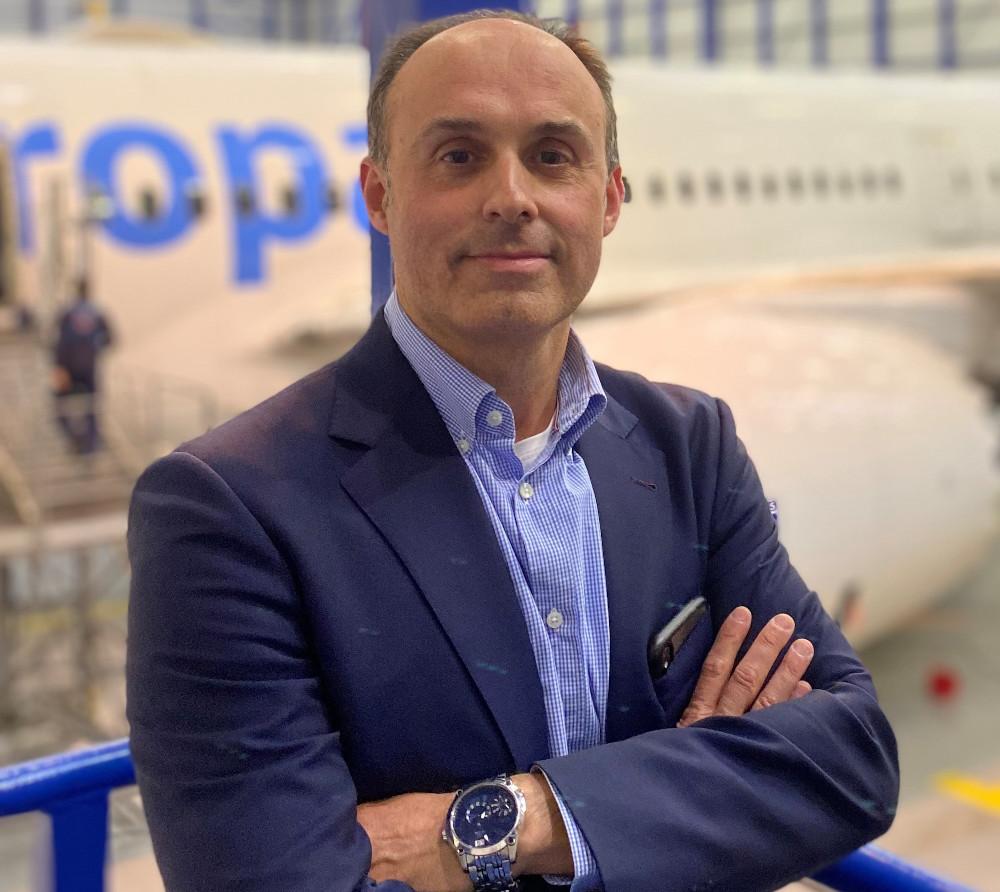
Oscar Perez, managing director at Globalia Maintenance.
Oscar Perez, managing director at Spain-based Globalia Maintenance, discusses the company's plans to establish a widebody center of excellence in Madrid and its investments aimed at reducing lead times.
How is Globalia managing capacity at its facility in Palma? How have you looked to drive efficiencies across the maintenance hangar?
At Globalia Maintenance, although safety is our first priority, we are continuously seeking ways to improve and innovate our processes. Our goal is to ensure our customers' experience is optimal, so we devote every effort to TAT, quality and costs. We have implemented a series of initiatives to drive efficiency in our maintenance hangar in Palma, such as a clear and well communicated vision and strategy to all our employees, process digitalization on engineering requests, automation such as vending machines for consumables, tailored KPIs (key performance indicators) at shop level owned by bay personnel, and launching a program to implement predictive maintenance. The people factor is key to drive efficiencies, and the recently signed bargain agreement seeks stability to focus on business transformation.
How are both the widebody and narrowbody maintenance segments performing in terms of demand? Where are you seeing strong customer demand in your shop?
There’s no doubt we are living at a time of extraordinary high demand for maintenance. While the airline market is back to pre-pandemic figures, we are seeing strong demand for both widebody and narrowbody aircraft. Time scales to book slots are increasing as customers look to be on the safe side for their aircraft maintenance. Moreover, there are also short- term opportunities the MROs need to pay attention to in order to monetize cost increases. Demand for Airbus A330 and Boeing 787 maintenance is especially strong for widebodies, as well as delivery and redelivery operations for A320 and 737 narrowbody aircraft. We are proud to say we are in a position to target long term, high-volume customers, providing competitive costs while keeping the confidence in our performance.
What are latest plans for a new hangar in Madrid? When will construction finish and what volumes will this give the company?
The new widebody hangar in Madrid is part of our strategy of efficient and profitable growth. The construction will be finished by the end of the year so we will be able to start operations in Q1 2024. In terms of maintenance man-hours, the new hangar will approximately double our current capacity, reaching 500,000 man-hours on both facilities when running at their optimum capacity. The new hangar also will add additional production and cost efficiencies by segregating the operations of narrowbody and widebody aircraft.
What was the thinking behind expanding to another facility in Spain? Why was Madrid chosen as the location?
Opening a facility in Madrid is a key part of our strategy of keeping the narrowbody center of excellence in Palma and opening the widebody one in Madrid. While Palma is exceptionally well connected to many European destinations, the Madrid airport is one of the most important hubs in Europe, with a large number of international and national flights. According to Aena data, the total number of operations at Madrid airport in 2022 was over 2.2 million. Madrid is the home base for Air Europa's long-haul 787 fleet. It is a city with a privileged geographical location, which makes it an important connection point between Europe and Latin America. This makes it an ideal location to reduce costs and aircraft downtime. Other than that, Madrid is a city with a large aeronautical industry, which makes it an ideal place to find qualified personnel.
What are you seeing in terms of extended lead-times? Also, does Globalia see opportunity to add repair capability in the future to mitigate against these extended TATs?
The biggest challenge we face at Globalia Maintenance is finding qualified personnel to be able to absorb the amount of work we receive. The demand for aircraft maintenance technicians around the world is increasing, making it difficult to find qualified personnel. To address this problem, it is important that we work to make Globalia Maintenance an attractive place to retain great professionals. Believing in the project, offering opportunities for professional growth and development, a positive and collaborative work environment are key factors for talent retention. Training is also crucial, as we have just made a large investment in both training and tools to widen our capabilities to include the A320neo and 737 Max aircraft. Other than that, the Madrid base will widely develop composite repairs, including for 787 and A350 aircraft.
